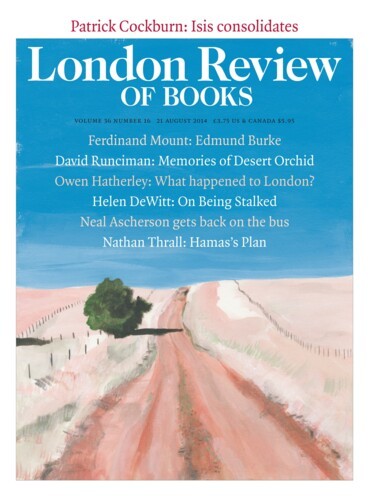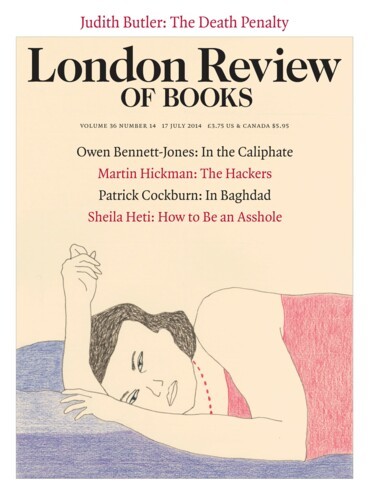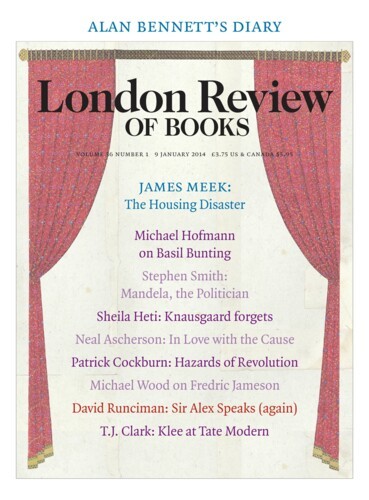It was difficult at times to recall that the military intervention in Iraq being debated in the House of Commons involves sending six Tornadoes to bomb suspected Isis positions. It is very much a symbolic action from the British point of view. MPs seemed to be trying to grapple with the complexity of what is happening but not quite succeeding. Cameron and others made great play with the idea that military action is in support of a new, inclusive Iraqi government, when in fact it is as Shia-dominated as the old. Its most effective military strike force are Iranian-managed Shia militias but they, along with the Iraqi army, terrify the Sunni.
Patrick Cockburn
Patrick Cockburn is a Middle East correspondent for the i Paper. His books include a memoir, The Broken Boy, as well as several studies of the conflict in Iraq and, most recently, Believe Nothing until It Is Officially Denied, on Claud Cockburn.
The killing of James Foley by Isis caused an upsurge of international revulsion and condemnation with harsh words from the US defence secretary and others. But the Obama administration is trying hard not to be sucked into a war that could be more serious than the US invasion and occupation of Iraq between 2003 and 2011. What Isis showed by Foley's very public murder is that it will always raise the stakes in any confrontation with the US and anybody else. It trumped America's reassuring portrayal of the recapture of Mosul Dam by the Kurds aided by US air strikes as a sign that Isis could be defeated.
Isis consolidates
Patrick Cockburn, 21 August 2014
As the attention of the world focused on Ukraine and Gaza, the Islamic State of Iraq and Syria (Isis) captured a third of Syria in addition to the quarter of Iraq it had seized in June. The frontiers of the new Caliphate declared by Isis on 29 June are expanding by the day and now cover an area larger than Great Britain and inhabited by at least six million people.
Battle for Baghdad
Patrick Cockburn, 17 July 2014
In early June, Abbas Saddam, a private soldier from a Shia district in Baghdad serving in the 11th Division of the Iraqi army, was transferred from Ramadi, the capital of Anbar province in western Iraq, to Mosul in the north. The fighting started not long after he got there. But on the morning of 10 June the commanding officer told his men to stop shooting, hand over their rifles to the insurgents, take off their uniforms and get out of the city. Before they could obey, their barracks were invaded by a crowd of civilians.
Hazards of Revolution
Patrick Cockburn, 9 January 2014
Soon after the Libyan capital fell to the rebels in August 2011 I got to know a 32-year-old man called Ahmed Abdullah al-Ghadamsi. We met when he tried to evict me from my hotel room, which he said was needed for members of the National Transitional Council, in effect the provisional government of Libya. I wasn’t happy about being moved because the hotel, the Radisson Blu on Tripoli’s seafront, was full of journalists and there was nowhere else to stay. But Ahmed promised to find me another room, and he was as good as his word.
Podcasts & Videos
Patrick Cockburn and Rachel Shabi: The Age of Jihad
Patrick Cockburn
On 18th October 2016, the second day of the Mosul offensive, Patrick Cockburn discussed his latest book, The Age of Jihad: Islamic State and the Great War for the Middle East with the Guardian’s Rachel...
Pieces about Patrick Cockburn in the LRB
Scoops and Leaks: On Claud Cockburn
Neal Ascherson, 24 October 2024
To the end of his life, Claud Cockburn stuck to two core beliefs. The first was his instinctive scepticism and cynicism about all who hold authority. But it was his second core belief that really drove...
The Hijackers: What will happen to Syria?
Hugh Roberts, 16 July 2015
American intelligence saw Islamic State coming and was not only relaxed about the prospect but, it appears, positively interested in it.
Keeping Their Distance: Muqtada al-Sadr
Charles Tripp, 17 July 2008
This is a strange time in Iraq. Local actors and regional powers are watching each other and the Americans, waiting to see what the US election will bring. For their part, the Americans are...
Lust for Leaks: The Cockburns of Cork
Neal Ascherson, 1 September 2005
In the early summer of 1956, an epidemic of poliomyelitis broke out in the city of Cork. It was not unexpected. The Irish medical authorities had noted the two-year gap between previous...
Read anywhere with the London Review of Books app, available now from the App Store for Apple devices, Google Play for Android devices and Amazon for your Kindle Fire.
Sign up to our newsletter
For highlights from the latest issue, our archive and the blog, as well as news, events and exclusive promotions.




